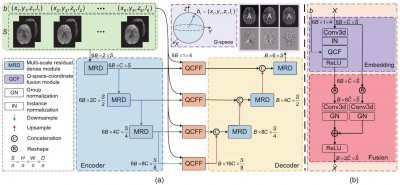Diffusion tensor imaging (DTI) is a widely used imaging technique in medical fields for mapping the microstructure and structural connectivity of living human brain tissue. Recently, deep learning methods have been proposed to rapidly estimate diffusion tensors (DTs) using only a small quantity of diffusion-weighted (DW) images. However, these methods usually rely on DW images obtained with fixed q-space sampling schemes as training data, which limits their application scenarios. To solve this problem, a research team from the State Key Laboratory of Public Big Data and College of Computer Science and Technology at Guizhou University developed a new deep neural network called q-space-coordinate-guided diffusion tensor imaging (QCG-DTI), which can efficiently and accurately estimate DTs under flexible q-space sampling schemes.
This study first proposes a q-space-coordinate-embedded feature consistency strategy to ensure the correspondence between q-space coordinates and their respective DW images. Then, a q-space-coordinate fusion (QCF) module is introduced, which efficiently embeds q-space coordinates into the multiscale features of the corresponding DW images by linearly adjusting the feature maps along the channel dimension, thus eliminating the dependence on fixed diffusion sampling schemes. Finally, a multiscale feature residual dense (MRD) module is proposed, which enhances the network’s feature extraction and image reconstruction capabilities by using dual-branch convolutions with different kernel sizes to extract features at different scales.
Experimental evaluations were conducted on three datasets: the Human Connectome Project (HCP) dataset, the developing Human Connectome Project (dHCP) dataset, and the multicenter dataset of multishell diffusion MRI (MDM). The results show that compared with state-of-the-art methods relying on fixed sampling schemes, QCG-DTI can obtain high-quality diffusion tensors and derived parameters even when using DW images acquired with flexible q-space sampling schemes. Specifically, QCG-DTI reduces the mean absolute error by approximately 15% on fractional anisotropy (FA) and around 25% on mean diffusivity (MD) compared to state-of-the-art deep learning methods. It also shows strong robustness in tractography analysis, with more accurate reconstruction of major white matter tracts and higher dice scores.
The paper “Q-space-coordinate-guided neural networks for high-fidelity diffusion tensor estimation from minimal diffusion-weighted images” is authored by Maokun ZHENG, Zhi LI, Long ZHENG, Weidong WANG, Dandan LI, and Guomei WANG. Full text of the open access paper: https://doi.org/10.1631/FITEE.2400766.
